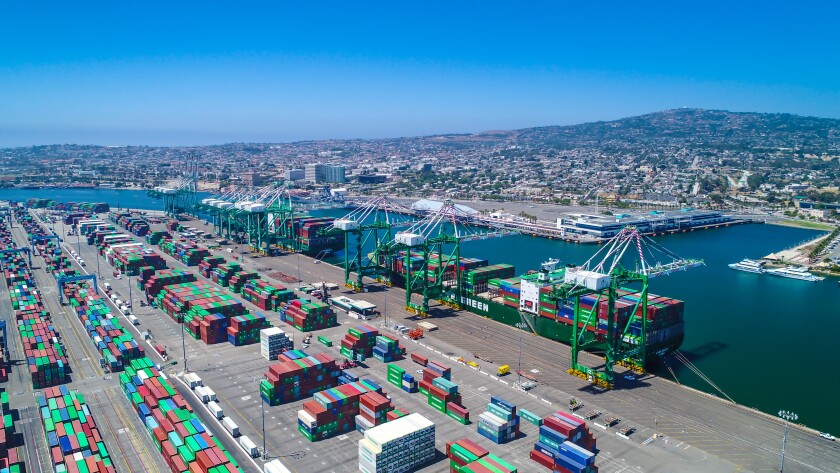The new facility, 2404 Pier A Way, boasts 26 360-kilowatt charging stations for electric drayage trucks.
It is the largest charging station of its kind for electric heavy-duty trucks at the port — but is only the start of creating the infrastructure that will be needed to come online quickly to meet for zero-emissions deadlines.
Still, the new charging station represented a step toward meeting those deadlines.
"Congratulations on this incredible accomplishment," U.S. Rep. Robert Garcia, D- Long Beach, said during the ribbon-cutting celebration.
The company WattEV partnered with Southern California Edison to power the station. WattEV is also currently working on three other similar facilities in warehouse districts, with one in Gardena, one near San Bernardino and the other in Bakersfield.
Charge times at the new port facility are two to three hours but there are plans to offer megawatt charging in the near future, which would reduce charge times to 20 to 40 minutes. That would be closer to normal rest stops for truck drivers, who depend on making frequent trips to earn their wages.
"Time is money" for drivers, said WattEV CEO Salim Youssefzadeh.
WattEv also offers new electric trucks for lease at the depot.
During Monday's ribbon-cutting event, various speakers said the new station is just the beginning of what will be needed.
By 2030, the port will need many more charging stations, "so we're going to need an Oppenheimer-sized scale up," said Patty Monahan of the California Energy Commission, referring to J. Robert Oppenheimer, the father of the atomic bomb and the subject of the blockbuster movie that opened this weekend.
The charging plaza is available to the public and designed for everyday use by truck operators and long-haul fleets serving the twin ports that process 40 percent of the nation's imports.
More truck charging bays will be added over time to the existing 26 stations at the WattEV facility.
The ports of Los Angeles and Long Beach must transition to all zero-emissions cargo handling equipment by 2030 and to an entirely zero-emissions drayage truck fleet by 2035.
The state of California also has required that any new drayage truck purchases be zero-emission beginning Jan. 1.
"The journey begins with steps like these," said Sharon Weissman, president of the Long Beach harbor commission. "The Port of Long Beach is committed to be a zero-emissions port."
The road to zero-emissions, though, is complicated. The technologies often are new and still evolving; the costs are high; and the commercial availability will be limited in the early years.
But Liane Randolph, chair of the California Air Recources Board, said it's all doable, adding that the new depot is a major milestone.
"The technology is there," she said.
"I spend a lot of time listening" to why the full transition won't work, Randolph said. "But we can overcome the challenges."
Youssefzadeh, meanwhile, said WattEV's other three locations are expected to be operating by the end of the year.
David Chow — vice president and chief operating officer of Calstart Inc., a national nonprofit that works to develop new, clean technologies — said in an interview after Monday's event that electric trucks have a range of 200 to 300 miles, with hydrogen-fuel zero-emissions technology capable of longer distances. Advancements, he said, are continually being made in the technology to bring longer-lasting and renewable batteries.
"It feels like all of us today are ushering in a new revolution," said Lindsay Shigetomi from the Environmental Defense Fund, a nonprofit advocacy group, "the electric truck revolution."
(c)2023 Daily Breeze, Torrance, Calif. Distributed by Tribune Content Agency, LLC.









